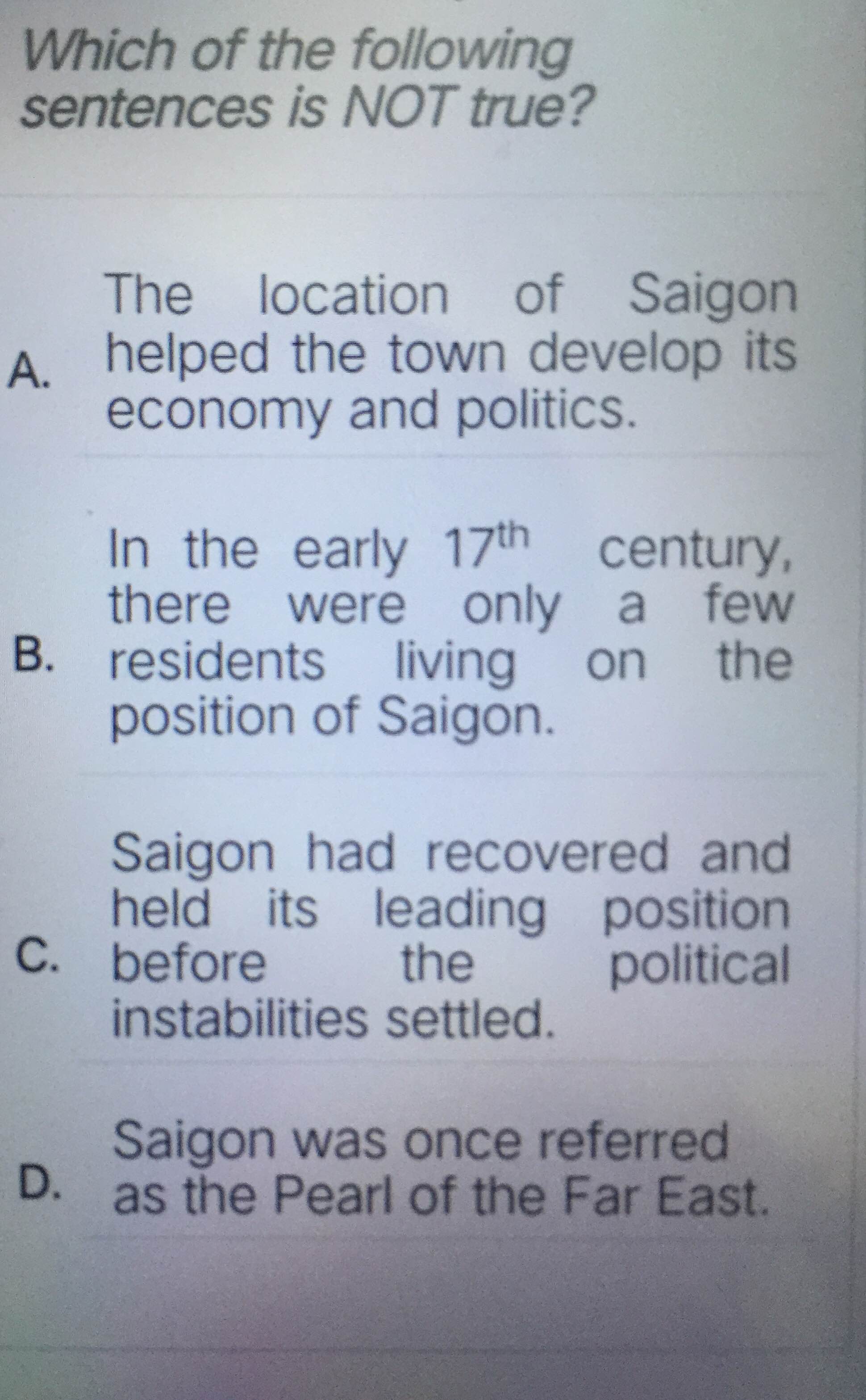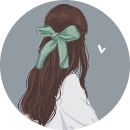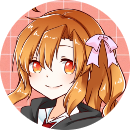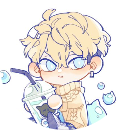Các câu hỏi tương tự
1._____happy in the new school,he missed his old friends. (Giải thích sao chọn với nha)
A.Usually B.Althought C.Being D.Even
2.___we leave at 3:00,we should get there by 5:30.(Giải thích sao chọn với nha)
A.Assuming B.Having assumed C.To assume D.Assumed
Exercise 2: Read the paragraph below. Then do the tasks that follow. Louis Braille was born in 1809 in Coupvray. He was a French teacher of the blind. He himself was blind from the age of thee. In 1818 he was a foundling (trẻ bỏ rơi) in the National Institute for the Young Blind in Paris (NIYBP). Soon showing marked ability in both science and music, he became famous in Paris as an organist and violoncellist. In 1826 Braille began teaching the blind in the institute. Braille is kn...
Đọc tiếp
Exercise 2: Read the paragraph below. Then do the tasks that follow.
Louis Braille was born in 1809 in Coupvray. He was a French teacher of the blind. He himself was blind from the age of thee. In 1818 he was a foundling (trẻ bỏ rơi) in the National Institute for the Young Blind in Paris (NIYBP). Soon showing marked ability in both science and music, he became famous in Paris as an organist and violoncellist. In 1826 Braille began teaching the blind in the institute. Braille is known for his idea modifying the Barrier “point writing” system, used for coded army messages, to enable the blind to read. Point writing consists of dots and dashes on cardboard; the Braille system derived from it is used successfully today in many countries.
Task 1: Match one word in A with its definition in B.
A | B |
1. blind 2. ability 3. marked 4. institute 5. consist of 6. foundling 7. derive | a. be formed from the things or people mentioned. b. to come or develop from sth. c. unable to see. d. a baby who has been left by its parents and who is found and taken care of by sb else. e. clear; noticeable; easily seen. f. the mental or physical capacity, power or skill required to do sth. g. an organization that has a particular purpose, especially one that is connected with education or a particular profession. |
Task 2: Decide whether the statements below are true (T) or false (F).
1. _________ Louis Braille was an engineer.
2. _________ Braille was blind in 1812.
3. _________ Braille studied sciences and music well.
4. _________ Braille invented the Barrier point writing system.
5. _________ The Braille system was used in the French army.
Task 3: Answer the questions.
1. When and where was Louis Braille born?
> ……………..................................................................
2. When did he begin teaching the blind in NIYBP?
> ……………..................................................................
3. What did the Braille system derive from?
> ……………..................................................................
4. What was used for coded army messages?
> ……………..................................................................
5. What does the Barrier point writing system consist of?
> ……………..................................................................
1.She is 1.7m in height .He is 1.6m in height (than)
2.the computer is expensive.I bought it in HCM city
-the computer which...........
3.The picture was beautiful .It was drawn by my close friend.
-the picture which............
4.Mr.Jump lives in a luxurious villa (using which)
.................
In the early 17th century, most of the southern region of Vietnam was nearly uninhabited and in the position of Ho Chi Minh City, there was a small village formed with a few residents. However, thanks to its advantage in location, the town grew both economically and politically. By the 19thcentury, this had become a cultural hub of the South as well as an important trading center of the country. You might not know that there was a time Saigon was referred to as the Pearl of the Far East. Sadly,...
Đọc tiếp
In the early 17th century, most of the southern region of Vietnam was nearly uninhabited and in the position of Ho Chi Minh City, there was a small village formed with a few residents. However, thanks to its advantage in location, the town grew both economically and politically. By the 19thcentury, this had become a cultural hub of the South as well as an important trading center of the country. You might not know that there was a time Saigon was referred to as the Pearl of the Far East. Sadly, having been through various occurrences and two disastrous wars has stunted the city’s development. Only after the political instabilities had settled, Saigon recovered miraculously and maintained its leading position in terms of both the economics and culture. Officially named as Ho Chi Minh City, Saigon today has 22 districts in total and attracts hundreds of thousands of tourists annually. whish of the following sentens is not true

Mn ơi câu này sao lại dùng " in " vậy ạ
1. The biggest Bear Straw Festival was the one celebrated................. 1980 in the UK.
A. in B.by C. Since
IV. READING COMPREHENSION A. Choose the one option - a, b, c or d - that best fits each of the num bared blank.Louis Braille was born in 1809 in Coupvray. He was a French (1) .................. of the blind. He (2) …................ was blind from the age of three, and in 1818 he went to the National Institute for the Young Blind in Paris. Soon showing marked (3) .................... in both science and music, he became famous in Paris as an organist and violoncellist. In 1826 Braille began tea...
Đọc tiếp
IV. READING COMPREHENSION
A. Choose the one option - a, b, c or d - that best fits each of the num bared blank.
Louis Braille was born in 1809 in Coupvray. He was a French (1) .................. of the blind. He (2) …................ was blind from the age of three, and in 1818 he went to the National Institute for the Young Blind in Paris. Soon showing marked (3) .................... in both science and music, he became famous in Paris as an organist and violoncellist. In 1826 Braille began teaching the blind in the school . Braille is known for his idea of (4) .................... the Briberies “point writing” system , used for coded army messages, to enable the blind to read. Point writing consists of embossed dots and dashes on cardboard; the Braille system (10) ................... from it is used successfully today, in slightly modified form, and in many countries.
1. a. designer b. doctor c. teacher d. lawyer
2. a. who b. whom c. himself d. for himself
3. a. activity b. ability c. intelligence d. determination
4. a. expressing b. learning c. bringing d. modifying
5. a. made b. taken c. done d. derived
Fill in the blanks with: sign, catch, panic, recovering, rescue, ran, saved.Jody Brown, age 6, is 1) ... in the hospital tonight after causing 2) ... this morning at her home in the country. She was playing in the yard when a scorpion stung her. She started screaming and her parents quickly came to the 3) .... The scorpion 4) ... off and, when her mother tried to find it, there was no 5) ... of it anywhere. It was lucky her parents were home and thats what 6) ... here life. Some pepole from the...
Đọc tiếp
Fill in the blanks with: sign, catch, panic, recovering, rescue, ran, saved.
Jody Brown, age 6, is 1) ... in the hospital tonight after causing 2) ... this morning at her home in the country. She was playing in the yard when a scorpion stung her. She started screaming and her parents quickly came to the 3) .... The scorpion 4) ... off and, when her mother tried to find it, there was no 5) ... of it anywhere. It was lucky her parents were home and that's what 6) ... here life. "Some pepole from the local zoo arrived to try and 7) ... the scorpion," said her mother," but it was gone."
V.Read the passage carefully and choose the best option (A, B, C or D) Galileo Galilei was one of the first modern scientists. He was born in Pisa, Italy, in 1564. At first he studied philosophy, but later he studied mathematics and astronomy. He was interested in the way the earth and other planets move around the sun. He found out several important facts about our world. He also started a new way of working in science. Before Galileo, scientists didn’t do experiments. They just guessed about...
Đọc tiếp
V.Read the passage carefully and choose the best option (A, B, C or D)
Galileo Galilei was one of the first modern scientists. He was born in Pisa, Italy, in 1564. At first he studied philosophy, but later he studied mathematics and astronomy. He was interested in the way the earth and other planets move around the sun. He found out several important facts about our world. He also started a new way of working in science. Before Galileo, scientists didn’t do experiments. They just guessed about how something happened. Galileo was different. He did not just make guesses. He did experiments and watched to see what happened.
Galileo was famous for his study of how things fall. He was the first person to do experiments about this problem. Before, people thought that heavy things fell faster than light things. He found out that this was not true. He took a heavy ball and a light ball and he dropped them both from a high place. They fell at the same speed. This meant that weight is not important. This is the law of falling bodies. It is an important law for understanding our world.
The life of the scientist was not always easy in the 1500s. For example, Galileo got into trouble because of his scientific ideas. His ideas were not the same as the religious ideas at the same time. Many religious people did not agree with him. During his whole life he had to worry about this. He even went to prison for a while. But no one could stop him from thinking. He continued to look for scientific answers to his questions about the world.
1. Galileo studied all the following EXCEPT _______.
a. philosophy b. experiments c. mathematics d. astronomy
2. Galileo started a new way of working in science in which__________.
a. he made guesses about how things happened.
b. he did experiments to see how things happened.
c. he was different from other scientists.
d. he did not do experiments
3. In his study of how things fall, Galileo found out __________.
a. that heavy things did not fall faster than light things.
b. that heavy things always fell faster than light things.
c. that weight was not important
d. both a and c
4. Which of the following is NOT true about Galileo ?
a. He was a famous Italian scientist.
b. He lived over four centuries ago.
c. Being sent to prison stopped him from exploring the world .
d. He got into trouble because he was a scientist.
WORD ORDER: Rearrange the given words in the most suitable order to make a meaningful sentence.31. in / was casually / faded / little boy / the, / jcans / dressed /32/ near the entrance / 20 minutes ago / the girl, to the Car Fair/ was last seen/ 31/ whal to wear/ every day / theres no need to think of/ for students il 32 / the last time / you corresponded /? / your best friend / when /with/ was ! 1. will la boat trip Ion / I hope/ the Mekong river / before that / fin Malaysia take/ returning ho...
Đọc tiếp
WORD ORDER: Rearrange the given words in the most suitable order to make a meaningful sentence.
31. in / was casually / faded / little boy / the, / jcans / dressed /
32/ near the entrance / 20 minutes ago / the girl, to the Car Fair/ was last seen/
31/ whal to wear/ every day / there's no need to think of/ for students il
32 / the last time / you corresponded /? / your best friend / when /with/ was !
1. will la boat trip Ion / I hope/ the Mekong river / before that / fin Malaysia take/ returning homell
2. in/ clothes/more/ activities/ casual/ have/ helps students/ freedom, everyday/ wearing / casual
1. how I in school / we / depends on / do / well / Our future
2. has been / The / the subject / for a / of poems / long time. Ao dai
31) spend their time/that some students/ listening in class/ Teachers say/ texting instead off./
→ Teachers say 32) her family Mrs Parker is so nicel a member of a woman/ hat Van feels likel./
1. ago / office / her / started lasten/ working / years / worker / five brother. /
2. Materiat, lealled / jean, I sailors / named ! from,/ after / Genoa / in /was / Italy. /
31. any rivers / in my hometown./ aren't/ There / and lakes/
32. be proud / encourages students to / of their schools. / Wearing uniforms/
they/ at/ necessary to / when /it secondary / is./ uniforms/ school / wear / are / students / for /
3. the / by / it / modernized/ lines / designers / Ao dal printing / of patterns / on / have/
4. the worldwide / the sale of jeans I got worse / in the 1990s / stopped growing / economic situation, and /














